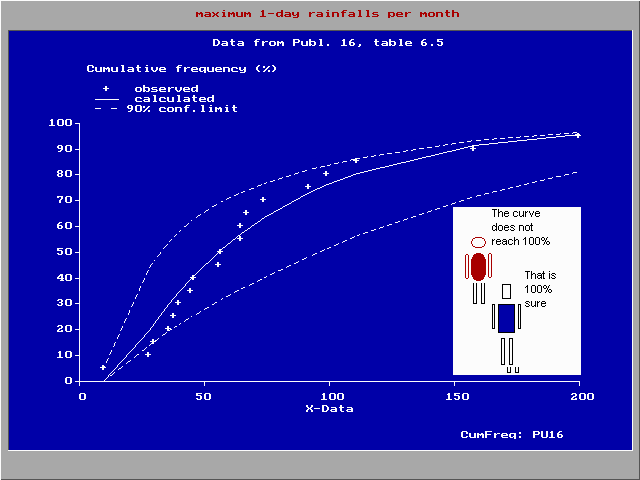A) Articles, papers and lecture notes
1. Regression analysis for water table, soil salinity plant growth and crop production
|
This is a book chapter dealing with the
principles
of linear regression analysis (least squares
method) including confidence statements and
segmented regression using a breakpoint. The table of contents may be viewed here. One may also consult a paper on crop production and soil salinity : evaluation of field data from India by segmented linear regression with breakpoint.
|
|
This is an article published in the
International Journal of Agricultural Science
in which 8 crops in three tropical countries
(Egypt, India and Pakistan) are studied.
|
|
This is an article entered in the
ResearchGate website
in which 4 crops in 4 tropical countries
(Australia, Egypt, England, and Surinam)
are studied.
|
|
This is a book chapter dealing with the frequency
analysis of hydrologic phenomena including
log-normal (lognormal), exponential, and Gumbel
distributions giving confidence belts and
discussing return periods (recurrence
intervals). The table of contents may be viewed here.
|
|
This is an article published in the
International Journal of Mathematical and
Computational Methods in which the
CumFreq
and CumFreqA models are used.
|
|
This is an article entered in the
ResearchGate website in which the usefulness
of this distribution that can be symmetrical,
skew to the left, or skew to the right
depending on the exponent to which the data
values are raised.
|
|
B) Free software and models The software is totally free. is meant for segmented cumulative frequency analysis using a breakpoint (break-point), which serves for example to study discontinuous probability distributions and return periods of hydrologic factors like rainfall, river and drain discharge, water and river level, depth or level of watertable, soil salinity, hydraulic conductivity (soil permeability for water). The computer program fits various linear, logarithmic, exponential and double exponential cumulative frequency distributions, including the normal, log-normal (lognormal), (log)logistic, Pareto, Weibull, Frechet (Fisher-Tippett type II), exponential (Poisson-like) and Gumbel probability distributions, and selects the best fitting distribution using the method of best fit.
|
 CumFreq for cumulative frequency analysis and probability distribution fitting |
|
NormDis A two-way calculator for the standard normal probability distribution: Value => Probability, and Probability => Value, which can be used for many kinds of statistical probability analysis.
|
 Segmented regression of mustard yield on soil salinity |
SegReg SegReg can be used for segmented linear regression, i.e. regression in segments, using a breakpoint (break-point) or threshold value, which serves for example to analyse the relation between plant growth or crop production in agriculture versus soil salinity and depth of watertable in agricultural land.
The segmentation is done by introducing a
breakpoint (break-point, threshold). Thus one can
obtain a broken, discontinuous, line.
Seven types of functions (0 to 6) are used.
Examples are given.
The selection of the best function type and
breakpoint is based on maximizing the statistical
coefficient of explanation (determination) and
performing the test of significance. The 90% confidence interval (belt) is given as well as an Anova table for variance analysis.
|
|
F-test calculator.
A calculator for the Fischer's F-test as used in
analysis of variance (Anova). The above SegReg
model uses this test for the significannce of the
regression. Like NormDis, this is also a two-way
calculator: F => Probability, and Probability => F
|
|
t-test calculator.
A calculator for the Student's t-test as used in
the
comparison of averages (means) of data series and
determining the statistical significance of the
difference between them using the t-probability
distribution.
Like NormDis and F-tester, the t-tester is also a
two-way calculator: t-value => Probability, and
Probability => t-value
|
C) Frequently asked questions
1 - What are the principles of cumulative frequency analysis and (discontinuous) probability distributions (used in the CumFreq program, see Software page or below), and what to do if there is a discontinuity? What is return period and how reliable is it?
|
This is the lecture note on
frequency
analysis. The table of contents can be inspected here. An article on the use of the binomial distribution for the determination of confidence intervals and belts for cumulative probability distributions can be downloaded from this place, while a summary of it can be found over here
|
2 - What are the principles of linear regression analysis (used in the SegReg program, see Software page or below) and how are confidence statements and intervals determined. What is breakpoint (break point), threshold, and coefficient of explanation (determination)?
|
This is the lecture note on
regression
analysis. The table of contents can be seen on line. |
3 - The SegReg model (see Software page) provides confidence intervals of the break-point in segmented linear regression analysis to test its statistical significance. Is it necessary to additionally perform an analysis of variance (ANOVA) and F-test and how is this done?
|
This is the Anova
paper
|
4 - Is there a calculator available for the F-test described under the previous question?
|
Yes, one may download the
F-test calculator here.
|
5 - Is there also a calculator available for the cumulative frequency in the standard normal distribution?
| Yes, one may download the standard normal distribution calculator here. |
OTHER
CATEGORIES:
software
& models
articles
& manuals
reports
& cases
reports
& cases
FAQ's
& papers
record
form
page